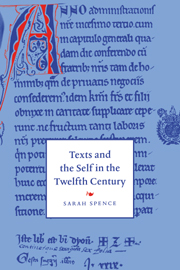Book contents
- Frontmatter
- Contents
- Acknowledgements
- 1 Corpus, body, text (and self)
- 2 Writing out the body: Abbot Suger, De administratione
- 3 Text of the body: Abelard and Guibert de Nogent
- 4 Text of the self: Guilhem IX and Jaufre Rudel, Bernart de Ventadorn and Raimbaut d'Aurenga
- 5 Writing in the vernacular: the Lais of Marie de France
- 6 Conclusion
- Works cited
- Index
- Cambridge Studies in Medieval Literature
4 - Text of the self: Guilhem IX and Jaufre Rudel, Bernart de Ventadorn and Raimbaut d'Aurenga
Published online by Cambridge University Press: 08 January 2010
- Frontmatter
- Contents
- Acknowledgements
- 1 Corpus, body, text (and self)
- 2 Writing out the body: Abbot Suger, De administratione
- 3 Text of the body: Abelard and Guibert de Nogent
- 4 Text of the self: Guilhem IX and Jaufre Rudel, Bernart de Ventadorn and Raimbaut d'Aurenga
- 5 Writing in the vernacular: the Lais of Marie de France
- 6 Conclusion
- Works cited
- Index
- Cambridge Studies in Medieval Literature
Summary
The purpose of both this chapter and the next is to suggest that vernacular literature of the twelfth century provides a literary arena that is comparable to the space inhabited by the self. Abelard and Suger each acknowledge the centrality of the body to the self but each demurs, as well. By contrast, the troubadours and Marie de France acknowledge the importance of the body and the world and, by composing in the vernacular, confront it. Because the vernacular is rooted in the body, it is a language that can address, by its very use, issues that arose in the margins of Suger and Abelard.
It is in vernacular literature, starting with that of the troubadours, that the space of agency first opens up. Aware of the distance between literature in Latin and speech in the vernacular, troubadour poets are always crossing a line, creating a hybrid form that elevates their mother tongue even as it measures itself against the Latin literary tradition. What surfaces again and again in this first vernacular poetry is an ambivalent focus on the body of the poet and his lady: that body both is and is not present in the poetry. The presence of this thematic suggests that even as the self is created by a recognition of and distancing from the body, so the vernacular tradition is created from the Latin precisely because the vernacular can be differentiated from Latin of the twelfth century by its being rooted in the body of the speaker.
- Type
- Chapter
- Information
- Texts and the Self in the Twelfth Century , pp. 85 - 118Publisher: Cambridge University PressPrint publication year: 1996

